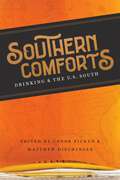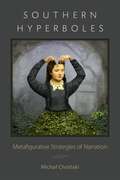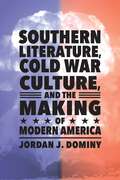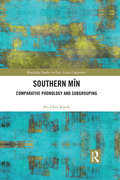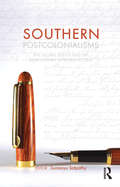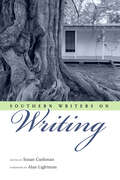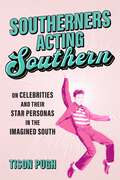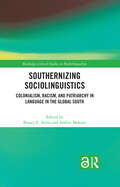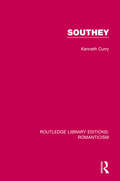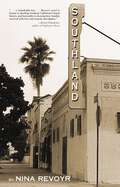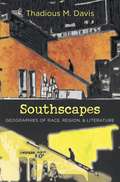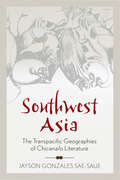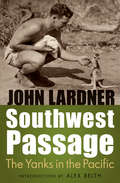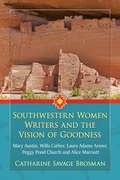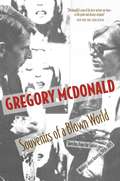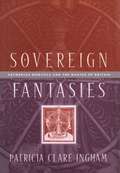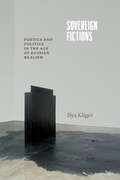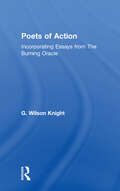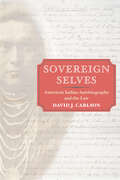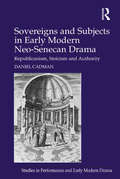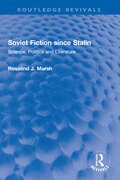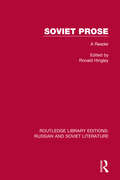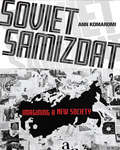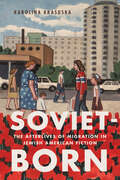- Table View
- List View
Southern Comforts: Drinking and the U.S. South (Southern Literary Studies)
by J. Gerald Kennedy Monica Carol Miller Susan Zieger Scott Romine Jerod Ra'Del Hollyfield Katharine Burnett Zackary Vernon David A. Davis Matthew Sutton Alison Arant John Stromski Cara Koehler Caleb Doan Ellen Lansky Jenna Sciuto Christopher Rieger Robert Rea Hannah C. Griggs Jennie Lightweis-GoffMoving beyond familiar myths about moonshiners, bootleggers, and hard-drinking writers, Southern Comforts explores how alcohol and drinking helped shape the literature and culture of the U.S. South. Edited by Conor Picken and Matthew Dischinger, this collection of seventeen thought-provoking essays proposes that discussions about drinking in southern culture often orbit around familiar figures and mythologies that obscure what alcohol consumption has meant over time. Complexities of race, class, and gender remain hidden amid familiar images, catchy slogans, and convenient stories. As the first collection of scholarship that investigates the relationship between drinking and the South, Southern Comforts challenges popular assumptions by examining evocative topics drawn from literature, music, film, city life, and cocktail culture. Taken together, the essays collected here illustrate that exaggerated representations of drinking oversimplify the South’s relationship to alcohol, in effect absorbing it into narratives of southern exceptionalism that persist to this day. From Edgar Allan Poe to Richard Wright, Bessie Smith to Johnny Cash, Bourbon Street tourism to post-Katrina disaster capitalism and more, Southern Comforts: Drinking and the U.S. South uncovers the reciprocal relationship between mythologies of drinking and mythologies of region.
Southern Gaul and the Mediterranean
by Alex MullenThe interactions of the Celtic-speaking communities of Southern Gaul with the Mediterranean world have intrigued commentators since antiquity. This book combines sociolinguistics and archaeology to bring to life the multilingualism and multiple identities of the region from the foundation of the Greek colony of Massalia in 600 BC to the final phases of Roman Imperial power. It builds on the interest generated by the application of modern bilingualism theory to ancient evidence by modelling language contact and community dynamics and adopting an innovative interdisciplinary approach. This produces insights into the entanglements and evolving configurations of a dynamic zone of cultural contact. Key foci of contact-induced change are exposed and new interpretations of cultural phenomena highlight complex origins and influences from the entire Mediterranean koine. Southern Gaul reveals itself to be fertile ground for considering the major themes of multilingualism, ethnolinguistic vitality, multiple identities, colonialism and Mediterraneanization.
Southern Hyperboles: Metafigurative Strategies of Narration (Southern Literary Studies)
by Michał ChoińskiIn Southern Hyperboles: Metafigurative Strategies of Narration, Michał Choiński confronts the often paradoxical and excessive elements of southern literature, focusing on dominant narrative modes and representation strategies in works produced from the early 1930s to the late 1950s. With renewed attention to renderings of the gothic and grotesque, Choiński argues that modernist literature from the U.S. South often deploys the trope of hyperbole, which escalates contrasts and disrupts the sense of the normal. By focusing on how writers processed the South via narratives of hyperbolic excess, Southern Hyperboles explores a mode of comprehension forged from the tensions of a segregated, patriarchal society driven by racial and social decorum. Moving chronologically, Choiński traces distinct manifestations of hyperbolic metalogic in the works of seven authors: Katherine Anne Porter, William Faulkner, Lillian Smith, Katherine Du Pre Lumpkin, Tennessee Williams, Flannery O’Connor, and Harper Lee. The mode of hyperbole identified by Choiński relies on a clash of opposites, along with the rapid intensification of disharmonious ideas pushed to extremes, leading to an ultimate break in established decorum. The shock produced by hyperbole generates a momentary state of confusion that soon dissipates, allowing recipients to reach a new understanding of their surrounding world.Melding an innovative use of rhetorical theory with fine-grained analysis of literary texts, Southern Hyperboles elucidates contradictory and interlocking issues related to memory, social trauma, grotesquerie, and troubled mythologies that permeate the U.S. South.
Southern Literature, Cold War Culture, and the Making of Modern America
by Jordan J. DominyDuring the Cold War, national discourse strove for unity through patriotism and political moderation to face a common enemy. Some authors and intellectuals supported that narrative by casting America’s complicated history with race and poverty as moral rather than merely political problems. Southern Literature, Cold War Culture, and the Making of Modern America examines southern literature and the culture within the United States from the period just before the Cold War through the civil rights movement to show how this literature won a significant place in Cold War culture and shaped the nation through the time of Hillbilly Elegy.Tackling cultural issues in the country through subtext and metaphor, the works of authors like William Faulkner, Lillian Smith, Robert Penn Warren, Eudora Welty, Ralph Ellison, Alice Walker, and Walker Percy redefined “South” as much more than a geographical identity within an empire. The “South” has become a racially coded sociopolitical and cultural identity associated with white populist conservatism that breaks geographical boundaries and, as it has in the past, continues to have a disproportionate influence on the nation’s future and values.
Southern Min: Comparative Phonology and Subgrouping (Routledge Studies in East Asian Linguistics)
by Bit-Chee KwokSouthern Mǐn refers to a group of Chinese dialects spoken mainly in Southeast China and Taiwan. This group occupies a special position in the study of Chinese dialects, not only because of its large population of speakers (around 48 million) but also because of its preservation of various archaic linguistic features long lost in other dialects. In this book, B.C. Kwok applies the comparative method on new fieldwork data to reconstruct the common sound system of ‘Proto-Southern Mǐn’, from which all modern Southern Mǐn varieties emerged. The syllable initials, finals and tonal categories of Proto-Southern Mǐn are illustrated by more than 500 examples. In addition, this book offers an alternative view on the subgrouping of 12 Southern Mǐn varieties. It proposes that the Quánzhōu dialect and the Zhāngzhōu dialect form the two main branches of the dialect group. This book should be of great interest to advanced students and scholars in the fields of historical linguistics and Chinese dialectology.
Southern Postcolonialisms: The Global South and the 'New' Literary Representations
by Sumanyu SatpathySouthern Postcolonialisms is an anthology of critical essays on new literary representations from the Global South that seeks to re-invent/reorient the ideological, disciplinary, aesthetic, and pedagogical thrust of Postcolonial Studies in accordance with the new and shifting politico-economic realities/transactions between the North and the South, as well as within the Global South, in an era of globalization. Since the emergence of Postcolonial Theory in the 1980s, the shape of the world has changed dramatically. Old Cold War boundaries have shifted in the wake of the collapse of communism, Globalization, on an unprecedented scale, has dramatically changed the meaning of time and space. The rise of the US as a new imperial power has profound implications for the world order. In the South, new emerging markets have challenged the older division of industrial ‘first world’ and non-industrial ‘third world’.In most parts of the world, the academy is struggling to keep up with these developments. One result has been a major transnational turn in the humanities and social sciences. Terms like ‘world history’, ‘globalization’, ‘glocalization’ and ‘transnationalism’ now dominate academic agendas worldwide. These changing circumstances raise far-reaching questions. What does the new emerging world order mean for established models of postcolonial theory? Is postcolonialism as a field of study being overtaken by models of globalization and transnationalism? What implications do the new configurations in the South have for postcolonial theory? This volume, drawn from a major literary conference at Delhi University, provides a set of perspectives on these questions. With a majority of contributions by scholars from the South, these research articles have a dual focus – they revisit older debates on postcolonial theory, while suggesting new perspectives and directions.
Southern Writers on Writing
by Susan CushmanContributions by Julie Cantrell, Katherine Clark, Susan Cushman, Jim Dees, Clyde Edgerton, W. Ralph Eubanks, John M. Floyd, Joe Formichella, Patti Callahan Henry, Jennifer Horne, Ravi Howard, Suzanne Hudson, River Jordan, Harrison Scott Key, Cassandra King, Alan Lightman, Sonja Livingston, Corey Mesler, Niles Reddick, Wendy Reed, Nicole Seitz, Lee Smith, Michael Farris Smith, Sally Palmer Thomason, Jacqueline Allen Trimble, M. O. Walsh, and Claude Wilkinson The South is often misunderstood on the national stage, characterized by its struggles with poverty, education, and racism, yet the region has yielded an abundance of undeniably great literature. In Southern Writers on Writing, Susan Cushman collects twenty-six writers from across the South whose work celebrates southern culture and shapes the landscape of contemporary southern literature. Contributors hail from Mississippi, Alabama, Louisiana, Tennessee, Georgia, South Carolina, North Carolina, Virginia, and Florida. Contributors such as Lee Smith, Michael Farris Smith, W. Ralph Eubanks, and Harrison Scott Key, among others, explore issues like race, politics, and family and the apex of those issues colliding. It discusses landscapes, voices in the South, and how writers write. The anthology is divided into six sections, including “Becoming a Writer;” “Becoming a Southern Writer;” “Place, Politics, People;” “Writing about Race;” “The Craft of Writing;” and “A Little Help from My Friends.”
Southerners Acting Southern: On Celebrities and Their Star Personas in the Imagined South (Southern Literary Studies)
by Tison PughWhat is the difference between a star born in the South and a “southern star”? In Southerners Acting Southern, Tison Pugh answers this intriguing question, pondering the ways in which some performers from the South metamorphose into southern stars by accentuating their geographic and cultural roots as key aspects of their star personas. Many celebrities, particularly actors, seek to transcend their hometown roots in favor of achieving an “all-American” appeal, but some stars born in the South build their national and international fan base by emphasizing the southern aspects of their biography and by leaning into regional clichés and stereotypes that percolate throughout the U.S. cultural imaginary. In turn, some southern stars trot out the region’s hoariest tropes of fading belles, gullible country rubes, and the succors of southern hospitality only to reveal the shallowness of these stereotypes and of their celebrity personas as well. Covering more than one hundred years of cultural history, Southerners Acting Southern allows readers to gauge the South’s often-reluctant progress into modernity, including discussions on the intersection of race and celebrity for the region’s Black stars and its increasing, if hesitant, embrace of queer ones. Chapters feature a wide-ranging selection of southern celebrities, including Louis Armstrong, Truman Capote, Elvis Presley, Tennessee Williams, Andy Griffith, Tina Turner, Dolly Parton, Tom Petty, Gloria Estefan, Oprah Winfrey, Reese Witherspoon, Jenna Bush Hager, Ellen DeGeneres, Tyler Perry, Matthew McConaughey, Aziz Ansari, and Miley Cyrus.Southerners Acting Southern moves from past to present, from musicians to media personalities, discerning the ways in which southernness contributes to the building of personal celebrity. Altogether, this luminous work of cultural criticism reveals that southern stargazing, as much as it might initially appear a flighty pastime of overzealous fans, divulges deeper truths about the South, and the United States as a whole, that might otherwise pass unnoticed.
Southernizing Sociolinguistics: Colonialism, Racism, and Patriarchy in Language in the Global South (Routledge Critical Studies in Multilingualism)
by Sinfree Makoni Bassey E. AntiaThis innovative collection offers a pan-Southern rejoinder to hegemonies of Northern sociolinguistics. It showcases voices from the Global South that substitute alternative and complementary narrations of the link between language and society for canonical renditions of the field. Drawing on Southern epistemologies, the volume critically explores the entangled histories of racial colonialism, capitalism, and patriarchy in perpetuating prejudice in and around language as a means of encouraging the conceptualization of alternative epistemological futures for sociolinguistics. The book features work by both established and emerging scholars, and is organized around four parts: The politics of the constitution of language, and its metalanguage, in the Global South; Who gets published in sociolinguistics? Language in the Global South and the social inscription of difference; and Learning and the quotidian experience of language in the Global South. This book will be of interest to scholars in sociolinguistics, applied linguistics, critical race and ethnic studies, and philosophy of knowledge.
Southey (Routledge Library Editions: Romanticism #7)
by Kenneth CurryFirst published in 1975. Southey first made his reputation, when he was a very young man, as a poet. Although he is now remembered primary for his poetry, this title reveals how he excelled in many other genres as well. Examination of Southey’s life reveals an attractive and humane personality, at ease among his books, his family and a wide and impressive range of friends, including Wordsworth, Coleridge, Lamb, Landor and Scott. This title will be of interest to students of literature.
Southland
by Nina RevoyrA compelling story of race, love, murder, and history against the backdrop of an ever-changing Los Angeles. "I'm an LA native with a lot of love for LA crime fiction, but instead of preaching to the noir choir about The Long Goodbye, I'd like to gush about Southland by Nina Revoyr. It's a brilliant, ambitious, moving literary crime novel about two families in South Los Angeles and their tangled history between the 1930s and the 1990s. The central mystery is the death of four black boys in a Japanese-American man's store during the Watts Rebellion of 1965. It's a powerful book, one that I think about often, as well as a huge influence on my work. Right up there with Chandler." --Stephanie Cha (of the LARB) in GQ on "The Greatest Crime Novelists on Their Favorite Crime Novels Ever" "A story about injustice dressed up as a detective novel, Southland reminds us that activism is both an ongoing project and a deeply personal choice." --Vallaire Wallace in Electric Lit on "The Novel That Shows Us How to Face our Past to Change Our Future" "Jackie Ishida's grandfather had a store in Watts where four boys were killed during the riots in 1965, a mystery she attempts to solve." --New York Times Book Review, Ross MacDonald on "Where Noir Lives in the City of Angels" "It is the kind of saga that often epitomizes and shocks LA--friction and violence between races and cultures." --Los Angeles Times, named one of the 20 Essential LA Crime Books "When I started working on Your House Will Pay, I hoped to write something that was half as smart and affecting as Southland. Revoyr's novel takes place in the Crenshaw district of Los Angeles, following two families--one black, one Japanese--over several decades. It's a character-driven saga with the engine of a crime novel, unravelling a horrific multiple murder that took place in the chaotic days of the Watts Rebellion in 1965." --The Guardian (UK), one of Steph Cha's Top 10 Books About Trouble in Los Angeles "[A]n absolutely compelling story of family and racial tragedy. Revoyr's novel is honest in detailing southern California's brutal history, and honorable in showing how families survived with love and tenacity and dignity." --Susan Straight, author of Highwire Moon Southland brings us a fascinating story of race, love, murder and history, against the backdrop of an ever-changing Los Angeles. A young Japanese-American woman, Jackie Ishida, is in her last semester of law school when her grandfather, Frank Sakai, dies unexpectedly. While trying to fulfill a request from his will, Jackie discovers that four African-American boys were killed in the store Frank owned during the Watts Riots of 1965. Along with James Lanier, a cousin of one of the victims, Jackie tries to piece together the story of the boys' deaths. In the process, she unearths the long-held secrets of her family's history. Southland depicts a young woman in the process of learning that her own history has bestowed upon her a deep obligation to be engaged in the larger world. And in Frank Sakai and his African-American friends, it presents characters who find significant common ground in their struggles, but who also engage each other across grounds--historical and cultural--that are still very much in dispute. Moving in and out of the past--from the internment camps of World War II, to the barley fields of the Crenshaw District in the 1930s, to the streets of Watts in the 1960s, to the night spots and garment factories of the 1990s--Southland weaves a tale of Los Angeles in all of its faces and forms.
Southscapes
by Thadious M. DavisIn this innovative approach to southern literary cultures, Thadious Davis analyzes how black southern writers use their spatial location to articulate the vexed connections between society and environment, particularly under segregation and its legacies. Basing her analysis on texts by Ernest Gaines, Richard Wright, Alice Walker, Natasha Trethewey, Olympia Vernon, Brenda Marie Osbey, Sybil Kein, and others, Davis reveals how these writers reconstitute racial exclusion as creative black space, rather than a site of trauma and resistance. Utilizing the social and political separation epitomized by segregation to forge a spatial and racial vantage point, Davis argues, allows these writers to imagine and represent their own subject matter and aesthetic concerns. Focusing particularly on Louisiana and Mississippi, Davis deploys new geographical discourses of space to expand analyses of black writers' relationship to the South and to consider the informing aspects of spatial narratives on their literary production. She argues that African American writers not only are central to the production of southern literature and new southern studies, but also are crucial to understanding the shift from modernism to postmodernism in southern letters. A paradigm-shifting work, Southscapes restores African American writers to their rightful place in the regional imagination, while calling for a more inclusive conception of region.
Southwest Asia: The Transpacific Geographies of Chicana/o Literature
by Jayson Gonzales Sae-SaueChicana/o literature is justly acclaimed for the ways it voices opposition to the dominant Anglo culture, speaking for communities ignored by mainstream American media. Yet the world depicted in these texts is not solely inhabited by Anglos and Chicanos; as this groundbreaking new book shows, Asian characters are cast in peripheral but nonetheless pivotal roles. Southwest Asia investigates why key Chicana/o writers, including Américo Paredes, Rolando Hinojosa, Oscar Acosta, Miguel Méndez, and Virginia Grise, from the 1950s to the present day, have persistently referenced Asian people and places in the course of articulating their political ideas. Jayson Gonzales Sae-Saue takes our conception of Chicana/o literature as a transnational movement in a new direction, showing that it is not only interested in North-South migrations within the Americas, but is also deeply engaged with East-West interactions across the Pacific. He also raises serious concerns about how these texts invariably marginalize their Asian characters, suggesting that darker legacies of imperialism and exclusion might lurk beneath their utopian visions of a Chicana/o nation. Southwest Asia provides a fresh take on the Chicana/o literary canon, analyzing how these writers have depicted everything from interracial romances to the wars Americans fought in Japan, Korea, and Vietnam. As it examines novels, plays, poems, and short stories, the book makes a compelling case that Chicana/o writers have long been at the forefront of theorizing U.S.-Asian relations.
Southwest Passage: The Yanks in the Pacific
by Alex Belth John LardnerAt a time when few Americans had visited Australia, journalist John Lardner sailed down under with the U.S. armed forces as one of the first American war correspondents in the Pacific theater. With his excellent sense of humor and gift for narrative, Lardner penned vignettes of MacArthur’s arrival and his reception in Melbourne and a flight with the daring Dutch flier Capt. Hans Smits. More frequently, Lardner wrote about the ordinary day and the average person. Traveling throughout the country, in Southwest Passage Lardner offers a glimpse of Australia in the 1940s and generates warmth and admiration for World War II fighters in the Pacific, whether Australian, New Zealander, aboriginal, or American. For generations of readers who have learned about World War II with the benefit of hindsight, Lardner’s tone, style, and selected topics give more than just entertaining anecdotes about the military in the Pacific; they are a view into the culture and society of midcentury America.
Southwestern Women Writers and the Vision of Goodness: Mary Austin, Willa Cather, Laura Adams Armer, Peggy Pond Church, Alice Marriott
by Catharine Savage BrosmanThis book, a project in literary history and criticism, examines five women authors of the American Southwest, two well known, three much less so: They stand out for their striving to give a woman's voice to aspects of the Southwest as it was during their lifetimes. All five authors displayed sensitivity to and concern for southwestern landscapes, arts, and people; they valued harmony in human relationships and endeavors; they were interested in the past and sought to preserve it. Marked differences in experience, temperaments, talents, and perspectives exist among them, however, although their common feminine condition supposes some similarity of approach, including limitations (biological and, to some degree, social).
Souvenirs of a Blown World: Sketches for the Sixties, Writings about America, 1966-1973
by Gregory McdonaldBestselling author of the Fletch series Gregory Mcdonald presents firsthand accounts of major events during the sixties and interviews with Joan Baez, Abbie Hoffman, Krishnamurti, Phil Ochs, Andy Warhol, and others. The year was 1966, and fresh off the heels of his controversial debut novel Running Scared, Mcdonald was hired to write for the Boston Globe with the instruction to "Go and have fun and write about it, and if you end up cut and bleeding on the sidewalk, call the office." Souvenirs of a Blown World is an exuberant account of the people, the encounters, and emotions that raced through the nation during those indelible years.You will follow a war-battered young soldier through the steamy quagmire of Vietnam, attend a barbeque bash in Dallas for the opening of John Wayne's two hundred and first picture, watch Jack Kerouac booze himself into hallucinatory eloquence, and run through the streets of Chicago during the 1968 Democratic National Convention. Captured in kaleidoscopic prose, this is the vanished world of America's revolt, the explosive second adolescence that shook old institutions to their foundations . . . the time we must relive and understand if we are to understand and live through our own.
Sovereign Fantasies: Arthurian Romance and the Making of Britain (The Middle Ages Series)
by Patricia Clare InghamDuring and after the Hundred Years War, English rulers struggled with a host of dynastic difficulties, including problems of royal succession, volatile relations with their French cousins, and the consolidation of their colonial ambitions toward the areas of Wales and Scotland. Patricia Ingham brings these precarious historical positions to bear on readings of Arthurian literature in Sovereign Fantasies, a provocative work deeply engaged with postcolonial and gender theory.Ingham argues that late medieval English Arthurian romance has broad cultural ambitions, offering a fantasy of insular union as an "imagined community" of British sovereignty. The Arthurian legends offer a means to explore England's historical indebtedness to and intimacies with Celtic culture, allowing nobles to repudiate their dynastic ties to France and claim themselves heirs to an insular heritage. Yet these traditions also provided a means to critique English conquest, elaborating the problems of centralized sovereignty and the suffering produced by chivalric culture. Texts such as Sir Gawain and the Green Knight, the Alliterative Morte Arthure, and Caxton's edition of Malory's Morte Darthur provide what she terms a "sovereign fantasy" for Britain. That is, Arthurian romance offers a cultural means to explore broad political contestations over British identity and heritage while also detailing the poignant complications and losses that belonging to such a community poses to particular regions and subjects. These contestations and complications emerge in exactly those aspects of the tales usually read as fantasy-for example, in the narratives of Arthur's losses, in the prophecies of his return, and in tales that dwell on death, exotic strangeness, uncanny magic, gender, and sexuality.Ingham's study suggests the nuances of the insular identity that is emphasized in this body of literature. Sovereign Fantasies shows the significance, rather than the irrelevance, of medieval dynastic motifs to projects of national unification, arguing that medieval studies can contribute to our understanding of national formations in part by marking the losses produced by union.
Sovereign Fictions: Poetics and Politics in the Age of Russian Realism (Thinking Literature)
by Ilya KligerAn exploration of Russian realist fiction reveals a preoccupation with the absolutist state. The nineteenth-century novel is generally assumed to owe its basic social imaginaries to the ideologies, institutions, and practices of modern civil society. In Sovereign Fictions, Ilya Kliger asks what happens to the novel when its fundamental sociohistorical orientation is, as in the case of Russian realism, toward the state. Kliger explores Russian realism’s distinctive construals of sociality through a broad range of texts from the 1830s to the 1870s, including major works by Tolstoy, Dostoevsky, Gogol, Pushkin, Lermontov, Goncharov, and Turgenev, and several lesser-known but influential books of the period, including Alexander Druzhinin’s Polinka Saks (1847), Aleksei Pisemsky’s One Thousand Souls (1858), and Vasily Sleptsov’s Hard Times (1865). Challenging much current scholarly consensus about the social dynamics of nineteenth-century realist fiction, Sovereign Fictions offers an important intervention in socially inflected theories of the novel and in current thinking on representations of power and historical poetics.
Sovereign Flower - Wilson Kni
by Wilson KnightFirst published in 2002. Routledge is an imprint of Taylor & Francis, an informa company.
Sovereign Selves: American Indian Autobiography and the Law
by David J. CarlsonThis book is an exploration of how American Indian autobiographers' approaches to writing about their own lives have been impacted by American legal systems from the Revolutionary War until the 1920s. Historically, Native American autobiographers have written in the shadow of "Indian law," a nuanced form of natural law discourse with its own set of related institutions and forms (the reservation, the treaty, etc.). In Sovereign Selves, David J. Carlson develops a rigorously historicized argument about the relationship between the specific colonial model of "Indian" identity that was developed and disseminated through U.S. legal institutions, and the acts of autobiographical self-definition by the "colonized" Indians expected to fit that model. Carlson argues that by drawing on the conventions of early colonial treaty-making, nineteenth- and early twentieth-century Indian autobiographers sought to adapt and redefine the terms of Indian law as a way to assert specific property-based and civil rights. Focusing primarily on the autobiographical careers of two major writers (William Apess and Charles Eastman), Sovereign Selves traces the way that their sustained engagement with colonial legal institutions gradually enabled them to produce a new rhetoric of "Indianness."
Sovereigns and Subjects in Early Modern Neo-Senecan Drama: Republicanism, Stoicism and Authority (Studies In Performance And Early Modern Drama Ser.)
by Daniel CadmanSovereigns and Subjects in Early Modern Neo-Senecan Drama examines the development of neo-Senecan drama, also known as ’closet drama’, during the years 1590-1613. It is the first book-length study since 1924 to consider these plays - the dramatic works of Mary Sidney, Samuel Daniel, Samuel Brandon, Fulke Greville, Sir William Alexander, and Elizabeth Cary, along with the Roman tragedies of Ben Jonson and Thomas Kyd - as a coherent group. Daniel Cadman suggests these works interrogate the relations between sovereigns and subjects during the early modern period by engaging with the humanist discourses of republicanism and stoicism. Cadman argues that the texts under study probe various aspects of this dynamic and illuminate the ways in which stoicism and republicanism provide essential frameworks for negotiating this relationship between the marginalized courtier and the absolute sovereign. He demonstrates how aristocrats and courtiers, such as Sidney, Greville, Alexander, and Cary, were able to use the neo-Senecan form to consider aspects of their limited political agency under an absolute monarch, while others, such as Brandon and Daniel, respond to similarly marginalized positions within both political and patronage networks. In analyzing how these plays illuminate various aspects of early modern political culture, this book addresses several gaps in the scholarship of early modern drama and explores new contexts in relation to more familiar writers, as well as extending the critical debate to include hitherto neglected authors.
Soviet Fiction since Stalin: Science, Politics and Literature (Routledge Revivals)
by Rosalind J. MarshFirst published in 1986, Soviet Fiction since Stalin presents a comprehensive overview of the literature of the post Stalin period in the Soviet Union. The rapid advances in science and technology in these years are reflected in the themes of many of the major novelists – Pasternak, Solzhenitsyn, Sinyavsky, Daniel and Grossman- and scientific subjects frequently offer a vehicle for the exploration of the wider socio-political, moral, and philosophical ideas. As the period advances, however, literature becomes the first medium in which to express mistrust of scientific advance, and hence, indirectly, of Soviet policy as a whole. Rosalind J. Marsh uses a broad definition of ‘science’ which enables her to cover topics ranging from de-Stalinization, nationalism, and anti- Semitism in science, to Lysenko and scientific charlatanism, the Soviet rejection of relativity theory and quantum mechanics, the atom bomb, and also such general problems as secrecy, careerism, and bureaucracy. The bulk of the book concentrates on the Khrushchev years but there is also plentiful discussion of more recent writing such as that of Zinoviev and Voinovich. This book will be of interest to students and researchers of Soviet literature, Russian Literature and literature in general.
Soviet Prose: A Reader (Routledge Library Editions: Russian and Soviet Literature #16)
by Ronald HingleyThis book, first published in 1959, contains passages with commentary from 12 of the most important Soviet authors. They are lively and typical passages, written in varying styles, depicting historical events such as the 1917 Revolution, collectivisation and the death of Stalin, as well as the everyday side of Soviet life. They are a key introduction to the Russian language used in the Soviet period, an analysis of the language used by its leading writers, and a snapshot of life in Russia at the time.
Soviet Samizdat: Imagining a New Society (NIU Series in Slavic, East European, and Eurasian Studies)
by Ann KomaromiSoviet Samizdat traces the emergence and development of samizdat, one of the most significant and distinctive phenomena of the late Soviet era, as an uncensored system for making and sharing texts. Based on extensive research of the underground journals, bulletins, art folios and other periodicals produced in the Soviet Union from the mid-1950s to the mid-1980s, Ann Komaromi analyzes the role of samizdat in fostering new forms of imagined community among Soviet citizens. Dissidence has been dismissed as an elite phenomenon or as insignificant because it had little demonstrable impact on the Soviet regime. Komaromi challenges these views and demonstrates that the kind of imagination about self and community made possible by samizdat could be a powerful social force. She explains why participants in samizdat culture so often sought to divide "political" from "cultural" samizdat. Her study provides a controversial umbrella definition for all forms of samizdat in terms of truth-telling, arguing that the act is experienced as transformative by Soviet authors and readers. This argument will challenge scholars in the field to respond to contentions that go against the grain of both anthropological and postmodern accounts. Komaromi's combination of literary analysis, historical research, and sociological theory makes sense of the phenomenon of samizdat for readers today. Soviet Samizdat shows that samizdat was not simply a tool of opposition to a defunct regime. Instead, samizdat fostered informal communities of knowledge that foreshadowed a similar phenomenon of alternative perspectives challenging the authority of institutions around the world today.
Soviet-Born: The Afterlives of Migration in Jewish American Fiction
by Karolina KrasuskaIn 2010, when The New Yorker published a list of twenty writers under the age of forty who were “key to their generation,” it included five Jewish-identified writers, two of whom—American Gary Shteyngart and Canadian David Bezmozgis—were Soviet-born. This publicity came after nearly a decade of English-language literary output by Soviet-born writers of all genders in North America. Soviet-Born: The Afterlives of Migration in Jewish American Fiction traces the impact of these now numerous authors—among others, David Bezmozgis, Boris Fishman, Keith Gessen, Sana Krasikov, Ellen Litman, Gary Shteyngart, Anya Ulinich, and Lara Vapnyar—on major coordinates of the Jewish American imaginary. Entering an immigrant, Soviet-born standpoint creates an alternative and sometimes complementary pattern of how the Eastern and Central European past and present resonate with American Jewishness. The novels, short stories, and graphic novels considered here often stage strikingly fresh variations on key older themes, including cultural geography, the memory of World War II and the Holocaust, communism, gender and sexuality, genealogy, and finally, migration. Soviet-Born demonstrates how these diasporic writers, with their critical stance toward identity categories, open up the field of what is canonically Jewish American to broader contemporary debates. This book is also freely available online as an open-access digital edition.
